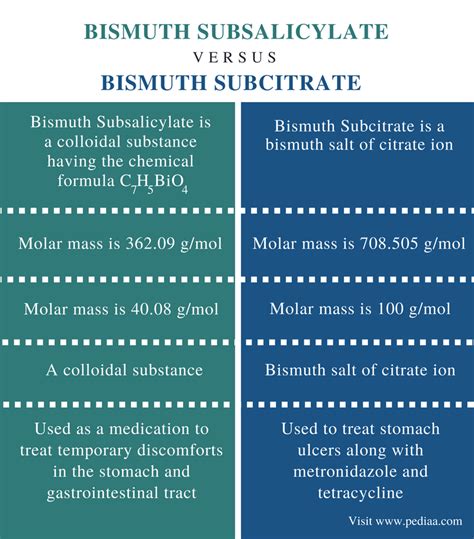Intro
Discover potential Bismuth Salicylates side effects, including gastrointestinal issues, skin reactions, and interactions, to ensure safe usage and minimize risks of adverse reactions, allergic responses, and digestive problems.
The importance of understanding the potential side effects of medications cannot be overstated, especially when it comes to compounds like bismuth salicylates. These substances have been used for various medicinal purposes, including the treatment of gastrointestinal issues and infections. However, like all medications, they come with their own set of risks and side effects. It's crucial for patients and healthcare providers to be aware of these potential issues to ensure safe and effective treatment. The complexity of the human body and its reactions to different substances means that even seemingly harmless medications can have significant side effects in certain individuals.
The use of bismuth salicylates is an area where careful consideration of side effects is particularly important. These compounds combine bismuth, an element with antimicrobial properties, and salicylates, which are related to aspirin and have anti-inflammatory and pain-relieving effects. While this combination can be effective for treating certain conditions, it also means that patients may be exposed to a broader range of potential side effects. Understanding these side effects is key to managing treatment effectively and minimizing risks to the patient.
The potential for side effects from bismuth salicylates underscores the need for vigilance and education among both healthcare providers and patients. By being informed about what to expect and how to manage any adverse reactions, individuals can make more informed decisions about their treatment options. Moreover, this knowledge can help in early detection and management of side effects, potentially preventing more serious complications. As with any medication, the goal is to balance the benefits of treatment with the risks, ensuring that patients receive the best possible care while minimizing adverse effects.
Bismuth Salicylates Overview

Components and Mechanism of Action
The mechanism of action of bismuth salicylates involves the bismuth component forming a protective barrier over ulcers, protecting them from acid and allowing them to heal. The salicylate component helps in reducing inflammation and pain. This dual action makes bismuth salicylates effective in treating gastrointestinal issues. However, the presence of salicylates also means that these medications can have side effects similar to those of aspirin, including gastrointestinal upset and, in rare cases, more serious effects like bleeding.Common Side Effects

Less Common but Serious Side Effects
While less common, there are more serious side effects associated with bismuth salicylates. These can include allergic reactions, which may manifest as hives, itching, swelling, or difficulty breathing. In rare cases, bismuth salicylates can cause more severe gastrointestinal issues, such as bleeding or perforation of the stomach or intestines. The salicylate component can also lead to an increased risk of bleeding, particularly in patients taking other medications that affect blood clotting, such as anticoagulants. Monitoring for these serious side effects is crucial, and patients should seek immediate medical attention if they experience symptoms such as severe abdominal pain, vomiting blood, or black tarry stools.Special Considerations and Precautions

Interactions with Other Medications
Bismuth salicylates can interact with other medications, which may lead to increased side effects or reduced efficacy of either the bismuth salicylate or the other medication. For example, taking bismuth salicylates with antacids can reduce the absorption of the bismuth component, potentially decreasing its effectiveness. Similarly, combining bismuth salicylates with other salicylate-containing medications can increase the risk of salicylate toxicity. Patients should inform their healthcare provider about all medications they are taking, including over-the-counter drugs and supplements, to minimize the risk of adverse interactions.Management of Side Effects

Alternative Treatments
For patients who experience significant side effects from bismuth salicylates or for whom these medications are contraindicated, there are alternative treatments available. These can include other types of antimicrobial agents, acid suppressors like proton pump inhibitors, or protective agents that form a barrier over ulcers without the use of bismuth or salicylates. The choice of alternative treatment depends on the specific condition being treated, the severity of the condition, and the patient's overall health status and medical history.Conclusion and Future Directions

Final Thoughts
As with any medication, the key to safe and effective use of bismuth salicylates is education and vigilance. Patients should be empowered with knowledge about their treatment options, including the potential benefits and risks. By working closely with healthcare providers and reporting any side effects promptly, patients can play an active role in managing their treatment and ensuring the best possible outcomes.What are the most common side effects of bismuth salicylates?
+The most common side effects include gastrointestinal upset such as nausea, vomiting, and diarrhea, as well as blackening of the tongue and stool.
Can bismuth salicylates interact with other medications?
+Yes, bismuth salicylates can interact with other medications, including antacids, anticoagulants, and other salicylate-containing drugs, which may lead to increased side effects or reduced efficacy.
What should I do if I experience severe side effects from bismuth salicylates?
+If you experience severe side effects such as bleeding, allergic reactions, or severe abdominal pain, you should seek immediate medical attention.
We hope this comprehensive overview of bismuth salicylates and their side effects has been informative and helpful. If you have any further questions or would like to share your experiences with these medications, please don't hesitate to comment below. Your input can help others make more informed decisions about their health. Sharing this article with others who may benefit from this information is also appreciated, as education and awareness are key to safe and effective medication use.
